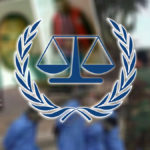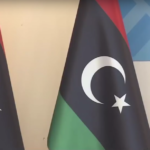Paris meeting stymied by failure to draft security sector reform plan and activate effective deterrence mechanisms
Libya Platform: Although an important step, Paris meeting stymied by failure to draft security sector reform plan and activate effective deterrence mechanisms
While welcoming the Tuesday May 29th meeting in Paris between warring Libyan parties and the UN and representatives of the international community, the Libya Platform fears this latest attempt to implement peace will prove futile once again. The Platform, a coalition of 15 Libyan organizations, doubts that Libya’s Presidential Council and House of Representatives, and the commander of the Libyan National Army (LNA), will fulfill their commitments. They have failed to do so since 2014, and the meeting did not produce deterrence or accountability mechanisms to induce the parties to change course.
In this context, the Platform objects to the meeting’s lack of genuine focus on urgently drafting a transparent plan for national security sector reform and the activation of deterrence mechanisms, especially the ICC, by the international community to hold the parties accountable if they fail to implement their commitments. The lack of such a plan as well as accountability mechanisms reduces the meeting’s effectiveness. Most critically, it assures the continued paralysis of the executive and legislative institutions, the continued obstruction of the democratic transition process and the work of the judiciary, and the continued inability to complete constitutional and electoral mandates.[1]
The Libya Platform underscores that despite the presence of all Libyan parties, UNSMIL and the Cairo representative at the Paris meeting, a critical opportunity was missed: the opportunity to formulate a practical plan – in the form of a bill – and draw a comprehensive and transparent national strategy to restructure the National Security Institute in the short, medium and long terms. Instead, the meeting focused on continued engagement with the UNSMIL on SSR and the ongoing negotiations in Cairo on security reform and unification, although both processes have failed. The UN mission has not taken serious steps to prioritize drafting a national plan with the Libyan authorities concerning restructuring and integrating combatants. The Cairo meetings have also not achieved any tangible results until now. These meetings, which lack transparency regarding what is being negotiated between commanders of armed groups, have not resulted in any practical plan regarding the unification of the armed forces, and the establishment and assurance of individual integration and a clear chain of command.
The Libya Platform reiterates its demands for the immediate drafting of an effective, practical plan to restructure the security apparatus and incorporate all its fragmented components, and for the enactment of international accountability mechanisms; first and foremost, authorization for an International Criminal Court (ICC) field office to operate in Libya. If these demands are not met, then the Paris meeting will be condemned to the same fate as previous attempts to achieve peace deals in Libya, such as the Libyan Political Agreement of 2015, the Paris summit of July 2017, and the Ghassan Salamé plan of 2017.
The culture of impunity and the lack of unified security sector unfetters warlords in eastern, western and southern Libya, allowing them to continually block, since 2014, the implementation of local reconciliation agreements. They have impeded the execution of the agreement between the Tawergha and Misrata communities, and have thwarted attempts at a peaceful solution to the siege of Derna. Militias and warlords have also undermined reconciliation between the Tebu and Awlad Suleiman tribes, enflaming an already dire humanitarian situation. As long as the absence of an accountability mechanism continues, there will be no deterrence stopping these groups from preventing the implementation of local accords and national peace agreements.
Furthermore, armed groups stymie the fulfilment of all parties’ obligations by incapacitating the legislative and executive authorities – including by further compounding the failure of the House of Representatives to achieve its legislative mandate of regulating the parliamentary and presidential elections, and the constitutional referendum. The consequences of this situation are dire on all levels –the daily lives of the people in Libya are disrupted not only by violence, but also by the deterioration of public services that is caused or exacerbated by this violence.
The Presidential Council and LNA, the heads of which attended Tuesday’s meeting in Paris, are escalating the violence through their respective militias. Armed groups continue to inflict brutal arbitrary attacks on civilians and infrastructure and to commit violations that could amount to war crimes[2] with full impunity, drawing massive sums from the state treasury and deriving formal legitimacy as nominal state security bodies. These groups regrettably enjoy direct cooperation with states like Italy,[3] Turkey, Egypt, and the UAE,[4] which bolsters their power and hinders unification under a single national security framework.
Further engorging the bloodshed devastating Libya, the militias include radical groups in their ranks, with close ties to al-Qaeda and the Madkhali Salafi movement. These militias claim to be fighting terrorism while committing the same violations as the terrorists. All of the combatants utterly disregard the Fourth Geneva Convention and the basic principles of humanitarian law in the framework of armed conflict, whether domestic or international.
Essential actors in furthering the democratic transition process – such as civil society, the judiciary, and the media- are under constant threat. In this regard, the Libya Platform cautions that the violence of these militias may extend to local civil society organizations, human rights defenders, members of the judiciary, media workers, civilians, and migrant workers. Practices such as arbitrary detention, torture, and extrajudicial killing are rampant and occurring in a context of increasing hate speech and incitement to violence. Many parties deploy religious rhetoric as a pretext to crack down on activists and rights defenders around the country.
The Libya Platform believes that completing the democratic transition, fighting terrorism, and achieving the national interest is entirely unfeasible and unattainable without effective government institutions capable of implementing four basic political processes. These processes are: enacting international accountability mechanisms, particularly through the ICC; restructuring and unifying the security sector; concluding the referendum on the Libyan constitution; and holding parliamentary and presidential elections. Unfortunately, progress towards these ends was not achieved at the recent Paris meeting, and the completion of Libya’s democratic transition remains beyond the horizon of its war-torn landscape.
[1] CIHRS research paper: Peace and Democratic Transition in Libya: A Dream Deferred or an Everlasting Nightmare?
[2] The Libya Platform condemns violations amounting to war crimes committed at Tripoli’s Mitiga Airport and nearby residential areas.
[3]Italy, Going It Alone, Stalls the Flow of Migrants. But at What Cost?
[4] According to reports on 2015, 2016, and 2017 from the UNSC Experts Committee, created by UNSC Resolution 1970/2011, states like Egypt, the UAE, and Turkey are supplying various Libyan parties with arms, despite Resolution 1970, issued unanimously on February 26, 2011. The resolution imposes sanctions on Libya, including an embargo on arms and military equipment to and from the country.




Leave a Reply
Want to join the discussion?Feel free to contribute!